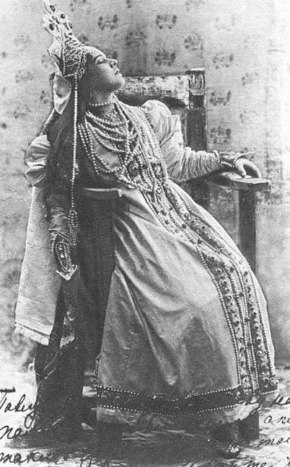The Tsar's Bride (opera)
| The Tsar's Bride | |
|---|---|
| Opera by Nikolai Rimsky-Korsakov | |

The death of Marfa, Nadezhda Zabela-Vrubel in the premiere
|
|
| Native title | Russian: Царская невеста, Tsarskaya nevesta |
| Librettist | Ilia Tyumenev |
| Language | Russian |
| Based on |
The Tsar's Bride by Lev Mey |
| Premiere | 1899 Private Opera Society, Moscow |
The Tsar's Bride (Russian: Царская невеста, Tsarskaya nevesta) is an opera in four acts by Nikolai Rimsky-Korsakov, the composer's tenth opera. The libretto, by Ilia Tyumenev, is based on the drama of the same name by Lev Mey. Mey's play was first suggested to the composer as an opera subject in 1868 by Mily Balakirev. (Alexander Borodin, too, once toyed with the idea.) However, the opera was not composed until thirty years later, in 1898. The first performance of the opera took place in 1899 at the Moscow theater of the Private Opera of S.I. Mamontov.
Rimsky-Korsakov himself said of the opera that he intended it as a reaction against the ideas of Richard Wagner, and to be in the style of "cantilena par excellence".
The Tsar's Bride is a repertory opera in Russia, although it is not part of the standard operatic repertoire in the West.
The Moscow premiere was given at the Private Opera Society, the scenic designer being Mikhail Vrubel. St. Petersburg had its premiere two years later at the Mariinsky Theatre with scenic designs by Ivanov and Lambin. Another notable performance was at the Bolshoy Theatre in Moscow, conducted by Emil Cooper (Kuper) and with scenic design by Konstantin Korovin, Golova, and Dyachkov. A film version was released in 1966 directed by Vladimir Gorikker.
One noted US production was in 1986 at Washington Opera.The Royal Opera premiere was given at Covent Garden in 2011, directed by Paul Curran, with set and costume design by Kevin Knight and lighting design by David Jacques.
...
Wikipedia
